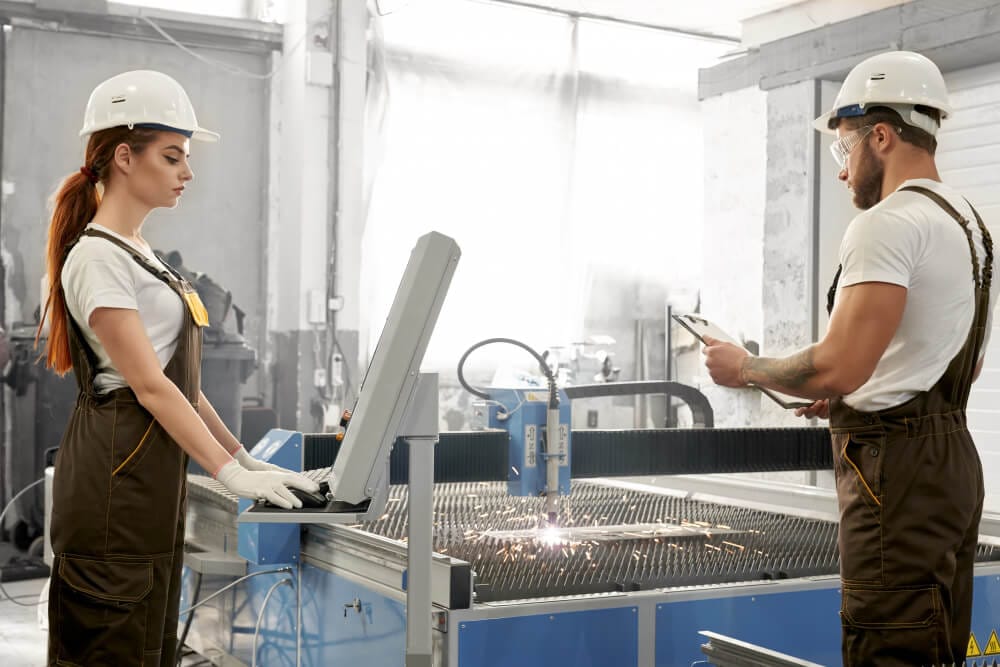Manufacturing Industry
A strong digital presence for manufacturing websites is essential for efficiency and client engagement. Key features include product showcases, easy order navigation, client portals for inventory tracking, lead generation tools, and production process monitoring. Compliance updates and streamlined operations are also critical for staying competitive and meeting industry standards.
Main Role of a Website in the Manufacturing Industry
A manufacturing industry website serves as a central hub for showcasing products, managing orders, and improving client interaction. It provides easy navigation for clients to view product specifications, place orders, and track shipments, improving the overall user experience. Websites also offer real-time communication through live chat and customer support, which helps address concerns quickly and keeps clients informed.
Additionally, manufacturing websites can integrate features for inventory management and detailed reporting, ensuring smooth operations. By offering online catalogs and resources, the website empowers customers with the knowledge needed to make informed decisions about products and services.
Our Story & Industry Leadership
A manufacturing industry website should include a company overview section to highlight its background, expertise, and key achievements. This section should feature:
- Company History: A timeline outlining its foundation, growth, and major accomplishments.
- Core Values & Mission: A clear statement of business goals, innovation strategies, and sustainability efforts.
- Leadership & Expertise: Profiles of key executives and management teams.
- Certifications & Compliance: Details on industry standards, quality assurance, and regulatory compliance.
This section enhances credibility by giving stakeholders, partners, and investors information about the company’s technological developments, manufacturing procedures, and contributions to the industry.
Manufacturing Projects & Operations
Manufacturing companies manage large-scale production facilities, each with unique processes and objectives. A dedicated website section showcasing detailed insights into ongoing and past operations is valuable. This section should include:
- Production Facilities: An interactive map displaying locations of manufacturing plants and distribution centers.
- Project Highlights: Case studies on successful product developments and innovations.
- Operational Efficiency: Insights into automation, supply chain management, and lean manufacturing techniques.
- Sustainability Initiatives: Information on eco-friendly manufacturing practices and regulatory compliance.
This level of detail enhances transparency and fosters trust among investors, regulatory bodies, and industry stakeholders by showcasing the company’s manufacturing capabilities, operational efficiency, and commitment to quality standards.

Investor Relations & Financial Insights
Manufacturing companies require significant capital investment, making a dedicated investor relations section essential. This should include:
- Financial Reports: Annual revenue statements, market performance, and investment insights.
- Shareholder Information: Updates on dividends, stock performance, and major announcements.
- Sustainability Initiatives: Reports on eco-friendly practices and corporate responsibility efforts.
- Future Plans & Investments: Information on new product lines, expansion, and investment opportunities.
- Sustainability Initiatives: Reports on eco-friendly practices and corporate responsibility efforts.
Product & Service Portfolio
For manufacturing companies, a comprehensive product and service section is essential. This can include:
- Product Catalog: A detailed list of manufactured goods, including specifications, uses, and variations.
- Service Offerings: A description of the services provided, such as custom manufacturing, product assembly, and after-sales support.
- Quality Standards: Information on product testing, certifications, and compliance with industry regulations.
- Innovative Solutions: Showcase of advanced manufacturing technologies or processes.
- Customization Options: Details on how products can be tailored to meet specific client needs.
Sustainable Manufacturing Practices
Environmental sustainability and corporate responsibility are crucial in the manufacturing industry due to the potential impact of production processes. A dedicated section on the website should focus on:

- Eco-Friendly Manufacturing Practices: Highlighting the use of sustainable materials and energy-efficient technologies.
- Waste Reduction Initiatives: Detailing efforts to minimize waste through recycling and reuse programs.
- Carbon Footprint Reduction: Sharing strategies to reduce emissions across the production process.
- Social Responsibility: Focusing on community engagement and ethical labor practices.
This section builds trust with stakeholders by showcasing the company’s commitment to sustainable manufacturing, ethical practices, and environmental responsibility. It highlights efforts to minimize environmental impact, improve social responsibility, and strengthen community relationships.

Customization & Design Services
Our manufacturing company offers personalized design services to meet specific client needs. From concept to production, we work closely with customers to create tailored solutions that align with their unique specifications. Whether it’s custom product features, colors, or packaging, our team ensures that every design is functional, aesthetically pleasing, and produced with the highest quality standards. This flexibility helps businesses achieve the exact product they envision, enhancing their brand and customer satisfaction.
We offer end-to-end customization solutions, from initial concept to final production, ensuring that the design perfectly aligns with your brand’s identity. Our team uses advanced technology and materials to bring your vision to life, while maintaining functionality and durability. Whether you need custom machinery, components, or packaging, our services cater to a wide range of manufacturing needs, helping you stay ahead in the competitive market.

